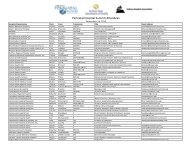2011 Report and Recommendations
Read the "2011 Report and Recommendations" - Youthlawteam.org
Read the "2011 Report and Recommendations" - Youthlawteam.org
- No tags were found...
Create successful ePaper yourself
Turn your PDF publications into a flip-book with our unique Google optimized e-Paper software.
• Gaps <strong>and</strong> barriers should be identified, <strong>and</strong> state officials<br />
<strong>and</strong> agencies should work in partnership with local communities<br />
to invest in addressing these obstacles through development<br />
of appropriate resources in all systems of care, so as to create<br />
continuous care for all youth.<br />
• St<strong>and</strong>ardization of response systems for youth with mental<br />
health needs should be developed through efforts of professional<br />
associations <strong>and</strong> oversight entities.<br />
• Training should be developed based on emerging best<br />
practices of those working with <strong>and</strong> caring for youth with<br />
mental health needs.<br />
• Best practices to respond to youth identified with mental<br />
health needs across systems should be implemented <strong>and</strong> extended<br />
beyond detention to other areas, such as first response, diversion,<br />
arrest, probation, detention, incarceration <strong>and</strong> reentry.<br />
Recommendation 4<br />
Viable options for funding the ongoing work of the Indiana<br />
Juvenile Mental Health Screening, Assessment & Treatment<br />
Project should be created through the state’s general budget<br />
allocation, with a focus on ongoing, long-term financial<br />
support for the administrative <strong>and</strong> oversight functions<br />
of the project, <strong>and</strong> through the development of state<br />
<strong>and</strong> local funding options that support increased<br />
access to mental health care for youth in detention.<br />
State-level financial support should be provided in order to<br />
sustain the pilot project’s continued development over time <strong>and</strong><br />
underwrite administrative costs of program oversight <strong>and</strong> data<br />
collection. Both state <strong>and</strong> local funding are needed to support<br />
increased access to care through timely access to treatment <strong>and</strong><br />
case management of youth in local programs (including diverted<br />
youth).<br />
• Identify sources for state-level support of the pilot project,<br />
including examination of dedicated funds.<br />
• Consider funding programs with awards to counties based<br />
on a statewide formula through use of a model such as the<br />
GAL/CASA model or LCC model. 2<br />
• Develop alternative local funding options <strong>and</strong> financial<br />
incentive programs. •<br />
1. The pilot project is guided <strong>and</strong> directed by the State Advisory Board,<br />
which was created through identifying <strong>and</strong> assembling key stakeholders<br />
of collaborating, cross-disciplinary agencies <strong>and</strong> organizations.<br />
The State Advisory Board includes representatives from the<br />
Indiana Judicial Center Juvenile Justice Improvement Committee,<br />
Indiana Criminal Justice Institute, Indiana Prosecuting Attorneys<br />
Council, Indiana Public Defender Council, Indiana Division of<br />
Mental Health & Addiction, Indiana Juvenile Detention Association,<br />
Indiana Minority Health Coalition, ISBA Civil Rights of Children<br />
Committee, Indiana Chapter of the American Academy of<br />
Pediatrics, Indiana University School of Medicine, Probation<br />
Officers Professional Association of Indiana, Indiana Department<br />
of Child Services, Indiana Department of Correction, Indiana<br />
Department of Education, <strong>and</strong> Indiana Council of Community<br />
Mental Health Centers. In addition to these representatives, a representative<br />
from each of the pilot site counties <strong>and</strong> three members<br />
of the Indiana General Assembly serve on the State Advisory Board.<br />
2. I.C. §5-2-11. The Governor’s Commission for a Drug-Free Indiana<br />
works in a collaborative capacity with 92 local coordinating councils<br />
(LCCs) representing each of Indiana’s counties.<br />
Indiana Juvenile Mental Health Screening,<br />
Assessment & Treatment Project Advisory Board<br />
Hon. Mary Harper, Valparaiso, chair; JauNae Hanger,<br />
Indianapolis, vice chair; Laurie Elliott, Indianapolis, project<br />
director; Amy Karozos, Indianapolis; Matthew Aalsma, Ph.D.,<br />
Indianapolis; Traci Agner, Lawrenceburg; Ashley Barnett,<br />
Indianapolis; Margaret Blythe, M.D., Indianapolis; Hon. Mary<br />
Beth Bonaventura, Crown Point; Becky Bowman, Indianapolis;<br />
Jason Bowser, Columbus; Bob Bragg, Noblesville; Matthew<br />
Brooks, Indianapolis; Rep. Charlie Brown, Indianapolis;<br />
Kristi Bruther, Franklin; Hon. Vicki Carmichael, Jeffersonville;<br />
Arthur Carter, Indianapolis; Hon. Steven David, Indianapolis;<br />
David Dickerson, Muncie; Hon. Nancy Gettinger, LaPorte;<br />
Jim Higdon, Franklin; Steve Johnson, Indianapolis; Larry L<strong>and</strong>is,<br />
Indianapolis; Sen. Connie Lawson, Indianapolis; Tanya Johnson,<br />
Indianapolis; Sue Lummus, Indianapolis; Tracey Malone,<br />
Kokomo; Mary McAteer, M.D., Carmel; Kellie Meyer,<br />
Indianapolis; Hon. Marilyn Moores, Indianapolis; David<br />
Orentlicher, Indianapolis; James Payne, Indianapolis;<br />
Mike Small, Marion; Hon. Paulette Stagg, Terre Haute;<br />
April Vanlonden, Richmond; Kellie Whitcomb, Indianapolis;<br />
Hon. Mary Willis, New Castle; <strong>and</strong> Jenny Young, Indianapolis.<br />
Editor’s Note: The above list does not yet include representatives from<br />
the three newest project sites of Elkhart, Vigo <strong>and</strong> Knox counties.<br />
6



